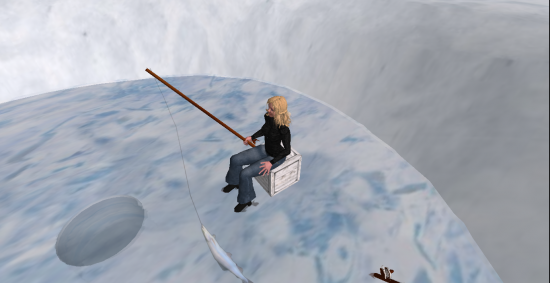The premise: I believe that we’re about to see the massive growth of a metaverse in which people can easily travel from one public world to another. Over time, the technology will become increasingly easy to use and realistic — and we will see an explosion of companies offering products and services in this metaverse. Â My team and I have been brainstorming some ideas of what these products and services will look like.

The business
Customers hypergrid teleport into a private fishing grid. There are regular fishing tournaments where enthusiasts can compete to catch the most fish or the biggest fish. When tournaments are not in sessions, they can practice fishing on a number of scenic lakes and rivers. The virtual fish run on custom scripting commands available only on this grid, which make the fish as realistic as possible. Fishermen can have their fish mounted to take with them, or put them in acquariums on their home grids, or release them back into the wild. It will take a lot of scripts to automate the fish, but OpenSim’s new Distributed Scene Graph will allow grid owners to bring in additional servers to handle the extra scripting load.
The revenue streams
In addition to tournament entry fees, grid owners can also make money by selling fishing licenses, fishing equipment and accessories, flies and bait, aquariums, and clothing. Outside merchants can rent space for stores or clubs. Companies can rent smaller copies of the grid for private functions. Grid owners can also rent our residential islands for those who want to spend more time in the world, with permanent residents getting discounts on fishing licenses or equipment or tournament entry fees.
Scalability
As the number of visitors grows, the company can add additional fishing spots, or duplicate existing areas in advance of big events. To keep customers coming back, new areas can be added on a regular basis — ice fishing, mountain streams, deep seas, coral reefs, rainforest rivers, and so on.
Competitive advantage
If the premise is successful, copycats will appear offering similar fishing destinations, or variations on the theme, such as hunting. The first company will have a lead in name recognition, and development lead time. For example, the company could spend a couple of years developing a realistic fishing simulation, modeling behavior of fish and insects in the virtual biosphere, then launch when viewer technology is good enough to make the experience accessible and enjoyable. A sufficiently advanced product will force competitors to postpone their launches until they’re comparable — or launch quickly but with inferior platforms.
Risks
As with any game, competitors can easily come and steal design ideas, and reverse-engineer the logic behind fish behavior and game functionality.
- Kitely Mega Worlds on sale for $90 per month - July 19, 2024
- OpenSim regions up, actives down with summer heat - July 15, 2024
- People think AIs are conscious. What could this mean for bots in OpenSim? - July 12, 2024
